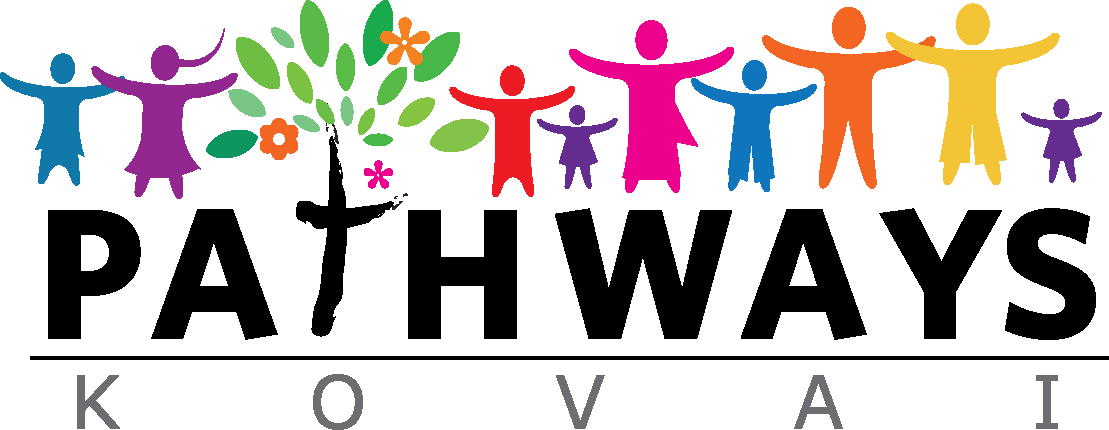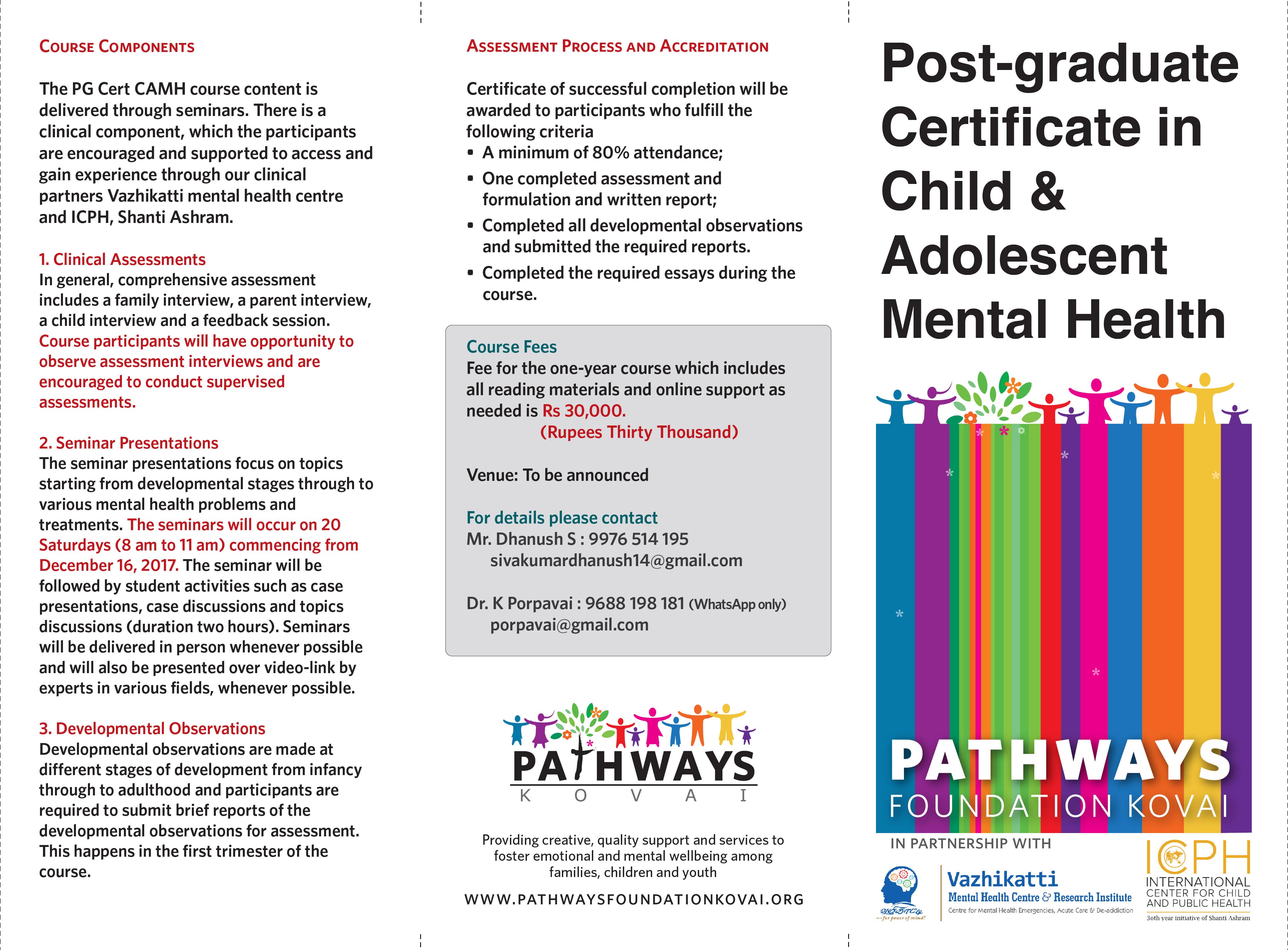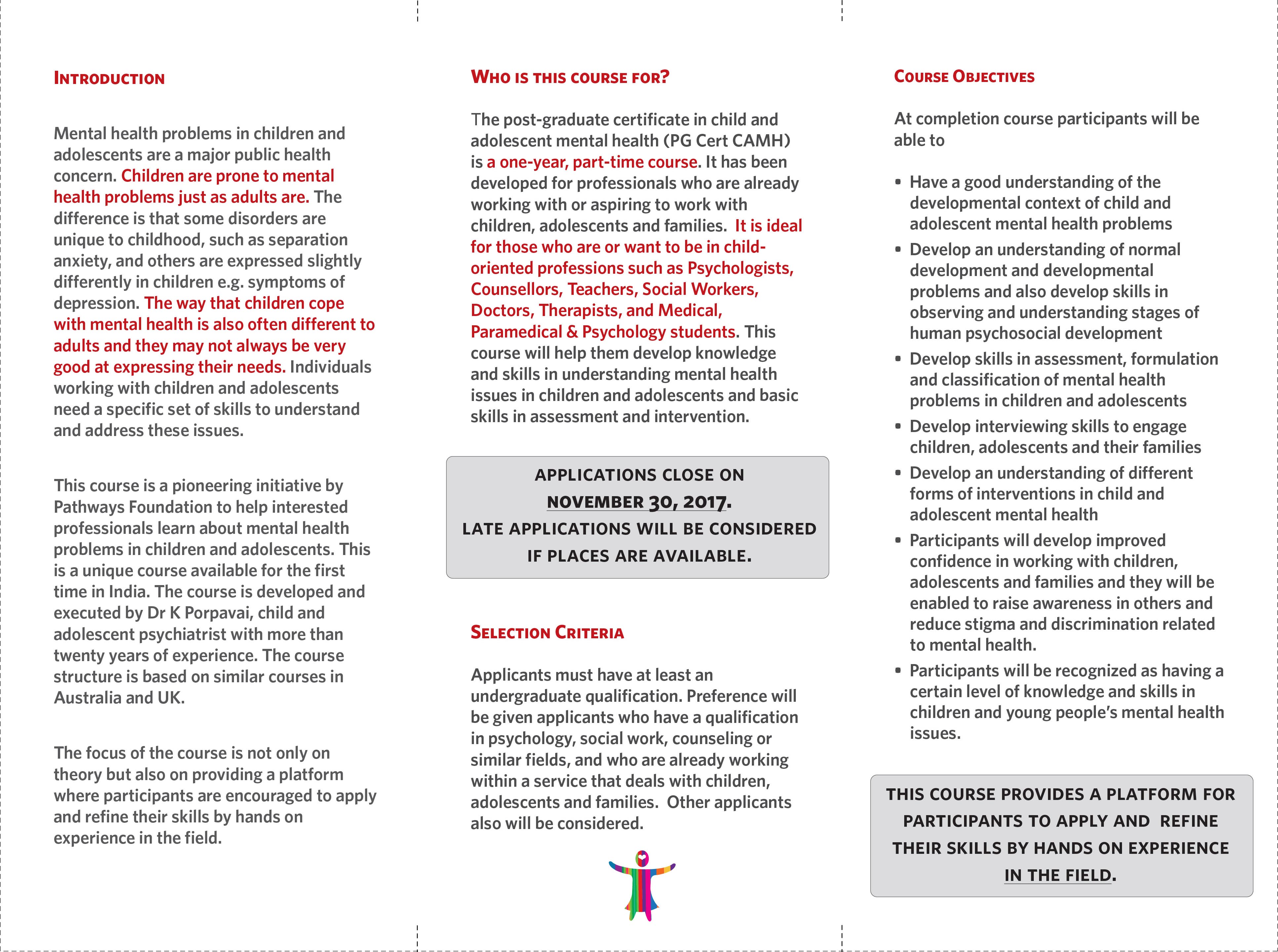Post-graduate Certificate in Child and Adolescent Mental Health
Mental health problems in children and adolescents are a major concern. In Indian, a meta-analysis done in 2014 found that prevalence rate of child and adolescent psychiatric disorders in the community was 6.46% and in the school it was found to be 23.33%. Despite this high prevalence there are no dedicated services for child and adolescent mental health in the community. Other barriers to meeting this need include the serious lack of child and adolescent mental health clinicians, with practically no training available.
Children are prone to mental health problems just as adults are. The difference is that some disorders are unique to childhood, such as separation anxiety, and others are expressed slightly differently in children e.g. symptoms of depression. The way that children cope with mental health is also often different to adults and they may not always be very good at expressing their needs. Individuals working with children and adolescents need a specific set of skills to understand and address these issues.
This course is a pioneering initiative by Pathways Foundation to help interested professionals learn about mental health problems in children and adolescents.
Who is this course for?
The post-graduate certificate in child and adolescent mental health (PG Cert CAMH) is a one-year, part-time course. It has been developed for professionals who are already working with or aspiring to work with children, adolescents and families. It is ideal for those who are or want to be in child – oriented professions such as Psychologists, Counsellors, Teachers, Social Workers, Doctors, Therapists, Medical, Paramedical & Psychology students. This course will help them develop knowledge and skills in understanding mental health issues in children and adolescents and basic skills in assessment and intervention.
This is a unique course available for the first time in India. The course is developed and executed by Dr K Porpavai, child and adolescent psychiatrist with more than twenty years of experience. The course structure is based on similar courses in Australia and UK.
Course Objectives
The focus of the course is not only on theory but also on providing a platform where participants are encouraged to apply and refine their skills by hands on experience in the field. This programme is designed and executed by Dr K Porpavai and other professionals trained in India and Australia who have extensive experience in the field for more than two decades.
At completion course participants will be able to
- Have a good understanding of the developmental context of child and adolescent mental health problems
- Develop an understanding of normal development and developmental problems and also develop skills in observing and understanding stages of human psychosocial development
- Develop skills in assessment, formulation and classification of mental health problems in children and adolescents
- Develop skills in interviewing skills to engage children, adolescents and their families
- Develop an understanding of different forms of interventions in child and adolescent mental health
- Participants will develop improved confidence in working with children, adolescents and families and they will be enabled to raise awareness in others and reduce stigma and discrimination related to mental health.
- Participants will be recognized as having a certain level of knowledge and skills in children and young people’s mental health issues.
Selection Criteria
Applicants must have at least an undergraduate qualification. Preference will be given applicants who have a qualification in psychology, social work, counseling or similar fields, and who are already working within a service that deals with children, adolescents and families. Other applicants also will be considered.
Applications close on 10th December 2017. Late applications will be considered if places are available.
Course Structure</strong professionals trained in India MH course content is delivered through seminars. There is a clinical component, which the participants are encouraged and supported to access and gain experience from clinical settings. The clinical settings currently will be provided by the child and adolescent psychiatry clinic at Vazhikatti mental health centre and International Centre for Child and Public Health (ICPH) , Shanti Ashram.
Clinical Assessments
In general, comprehensive assessment includes a family interview, a parent interview, a child interview and a feedback session. Course participants will have opportunity to observe assessment interviews and are encouraged to conduct supervised assessments.
Seminar Presentations
The seminar presentations focus on topics starting from developmental stages through to various mental health problems and treatments. The seminars will occur on 20 Saturdays (8 am to 11 am) commencing from December 16, 2017. The seminar will be followed by student activities such as case presentations, case discussions and topics discussions (duration two hours). Seminars will be delivered in person by Dr Porpavai and other teaching faculty from India and overseas. Seminars will be conducted in person whenever possible and presented over video-link at other times.
Developmental Observations
Developmental observations are made of the following stages: infancy; toddlerhood; pre-school child; school-age child; adolescence and parenthood. Each participant is required to submit brief reports summarising their formal observation of each of these stages. The reports are assessed and returned to the participants. This happens in the first trimester of the course.
Assessment Process and Accreditation
Certificate of successful completion will be awarded to participants who fulfill the following criteria
- A minimum of 80% attendance;
- One completed supervised assessment;
- Case report and relevant documentation to a satisfactory level;
- Submitted all the required assignments;
- Completed all developmental observation assignments and submitted the required reports.
Fees
Fee for the one-year course which includes all reading materials and online support as needed is Rs 30,000.
Learning Modules
- Stages of Child and adolescent development: Covers emotional, social, behavioural and neuropsychological aspects of development
1.1 Infancy Zero to Two years:
Infant Development,
Attachment and Separation,
Assessment and Clinical Implications
1.2 The Preschool Child Two to Five years:
Normal Development and Problems in Development
1.3 School age child six to eleven years
1.4 Adolescent Development twelve to eighteen years
- Clinical Assessment
2.1 Interview skills and history taking
2.2 Mental State Examination and observation of family interactions
2.3 Clinical and diagnostic formulation and treatment planning
2.4 Classification of mental health issues
- Developmental Problems
3.1 Intellectual Disability
3.2 Autism Spectrum Disorders
3.3 School underachievement and specific learning Disabilities
3.4 Other developmental disorders
- Behavioiural Problems
4.1 Attention Deficit Hyperactivity Disorder
4.2 Behavior disorders
- Emotional Problems
5.1 Anxiety Disorders
5.2 Depression and Suicide
- Psychosomatic Disorders
- Organic brain disorders
- Psychoses
- Childhood Trauma
6.1 Abuse, neglect and institutionalization
6.2 Child sexual abuse
- Family Violence and effects on children
- Challenges in Adolescence
8.1 Alcohol and other drug problems
8.2 Sexuality and relationships
8.3 Challenges in parenting adolescents
8.4 Problematic Internet and media use
- Treatment approaches
9.1 Psychological treatments
9.2 Medical management
9.3 Social and preventive interventions
9.4 Parent work


